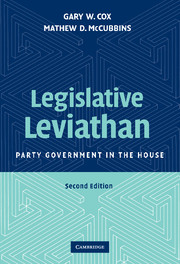Book contents
- Frontmatter
- Contents
- List of Figures
- List of Tables
- Acknowledgments
- Legislative Leviathan
- Introduction
- PART ONE THE AUTONOMY AND DISTINCTIVENESS OF COMMITTEES
- PART TWO A THEORY OF ORGANIZATION
- PART THREE PARTIES AS FLOOR-VOTING COALITIONS
- PART FOUR PARTIES AS PROCEDURAL COALITIONS
- 7 Party Loyalty and Committee Assignments
- 8 Contingents and Parties
- PART FIVE PARTIES AS PROCEDURAL COALITIONS
- Conclusion
- Appendix 1 Uncompensated Seniority Violations, Eightieth through Hundredth Congresses
- Appendix 2 A Model of the Speaker's Scheduling Preferences
- Appendix 3 Unchallengeable and Challengeable Vetoes
- Appendix 4 The Scheduling Power
- Bibliography
- Author Index
- Subject Index
7 - Party Loyalty and Committee Assignments
Published online by Cambridge University Press: 05 June 2012
- Frontmatter
- Contents
- List of Figures
- List of Tables
- Acknowledgments
- Legislative Leviathan
- Introduction
- PART ONE THE AUTONOMY AND DISTINCTIVENESS OF COMMITTEES
- PART TWO A THEORY OF ORGANIZATION
- PART THREE PARTIES AS FLOOR-VOTING COALITIONS
- PART FOUR PARTIES AS PROCEDURAL COALITIONS
- 7 Party Loyalty and Committee Assignments
- 8 Contingents and Parties
- PART FIVE PARTIES AS PROCEDURAL COALITIONS
- Conclusion
- Appendix 1 Uncompensated Seniority Violations, Eightieth through Hundredth Congresses
- Appendix 2 A Model of the Speaker's Scheduling Preferences
- Appendix 3 Unchallengeable and Challengeable Vetoes
- Appendix 4 The Scheduling Power
- Bibliography
- Author Index
- Subject Index
Summary
The evidence presented in Chapter 2 led us to question whether the committee assignment process in the postwar House has been mostly an exercise in self-selection, as is often asserted. There seems ample room in the process for discretion and, in particular, for partisan discretion. In this chapter we investigate whether partisan criteria enter the assignment process in a statistically discernible fashion. This issue is important because it relates to one of the key structural powers that party leaders might exercise. If they do not in fact use this power, then our view of how parties operate will need revision.
We are interested in particular in whether party leaders are able to affect committee assignment decisions. Certainly, the power of party leaders during the 1950s and 1960s was not what it once was. Until the revolt against “Boss” Cannon in 1910, the Speaker made all majority-party assignments (and, before the turn of the century, all minority-party assignments as well). Since the revolt, both parties have resorted to a system in which a party CC recommends all assignments, with the caucus ratifying (or rejecting) the committee's recommendations. No one, however, has argued that party leaders have had no influence over the appointments made by the parties' CCs. Indeed, there are many anecdotes illustrating the ability of party leaders to secure committee assignments for those they favor (thereby denying them to others less favored).
- Type
- Chapter
- Information
- Legislative LeviathanParty Government in the House, pp. 153 - 175Publisher: Cambridge University PressPrint publication year: 2007



